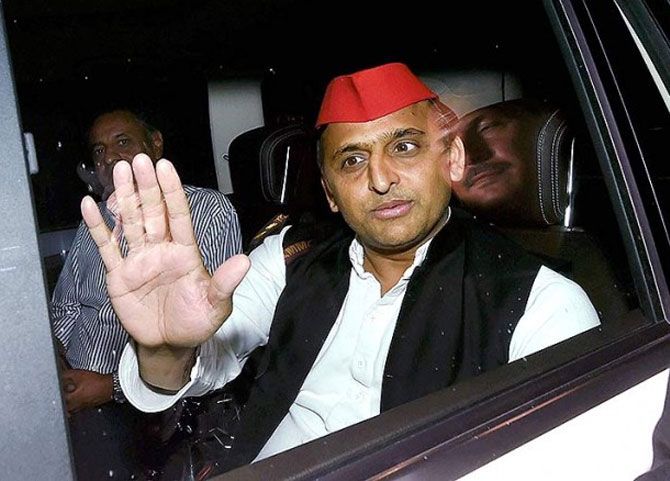'Perhaps it isn't protocol at all, but power before which we abase ourselves,' says Sunanda K Datta-Ray.

IMAGE: The deft footwork behind the Mayawati-Akhilesh meeting confirmed that protocol is as powerful in India's politics as it was in the film, Anna and the King of Siam, says Sunanda K Datta-Ray.
The deft footwork behind the March 14 meeting between Mayawati and Akhilesh Yadav confirmed that protocol is as powerful in India's democratic politics as it was in the film Anna and the King of Siam where no head could be higher than His Siamese Majesty's.
North Korean diplomats pulled out higher and higher stools at the Panmunjom peace talks for a similar reason.
Perhaps Indians are more meticulous than others about protocol.
Perhaps it isn't protocol at all, but power before which we abase ourselves.
When the Shah Commission asked Narain Dutt Tewari in 1977 if he had accompanied Sanjay Gandhi to Dehra Dun, the four time chief minister of Uttar Pradesh -- and later Uttarakhand -- shot back, 'No sir, Mr Gandhi accompanied me!'
People sniggered that he would have answered very differently if Indira Gandhi had still been prime minister and her beloved Sanjay a power behind her throne.
Who calls on whom is a moot point of social and diplomatic etiquette.
Lam Peck Heng, Singapore's high commissioner to India from 1993 to 1996, told me how delighted he was when on arriving in the old Rangoon on his first diplomatic posting as chargé d'affaires, he received a call from Preet Malik, India's ambassador whom he had known and admired in Singapore.
Malik wanted to call, but later changed his mind. "I was charge, he was ambassador!" the Singaporean explained ruefully.
This obsession with status became a major stumbling block in Indo-US relations.
Americans thought Indians prickly. A US ambassador, George Allen, commented on the 'Indian inferiority complex'. Others mentioned the alleged chip on the Indian shoulder.
Indians accused the Americans of duplicity. Americans claimed there could be no exact parity between the very different US and Indian systems, but constantly tried to exploit the ambivalence to their advantage.
High-ranking Americans themselves were finicky enough about rank for Daniel Patrick Moynihan to complain in his memoirs that although Henry Kissinger was his junior, he always managed to alight first when they were travelling in Air Force One.
Given this dexterity, the US successfully relegated successive Indian ambassadors in Washington to dealing with the assistant secretary or even his deputy when they should have dealt with the undersecretary of state.
In New Delhi, the US ambassador should have worked with a joint secretary, but usually saw the foreign secretary.
It was the height of American chutzpah when Robin Raphel, a favourite for whom Bill Clinton created the post of assistant secretary of state for South and Central Asia, not only taunted Indians with being 'touchy' but herself brashly demanded to see the prime minister, no less.
The Americans reversed their tactics when it came to the military, sending senior officers to bilateral meetings but asking for junior Indians in return.
Innocent, keen, and eager to see the world, young Indian defence services officers didn't mind. However, seasoned South Block diplomats suspected a plan to get hold of impressionable young Indians while sending only senior men who could assess India's entire defence system.
J N 'Mani' Dixit was one of the few Indian diplomats to avoid being downgraded without making a fuss.
When visiting Washington as foreign secretary, he claimed always to first touch base with his protocol opposite number, the undersecretary of state for political affairs, before settling down to business with the assistant secretary who was his junior but dealt with South Asia.
Some foreign office officials could take these things in their stride because they knew many American diplomats personally from postings abroad, international conferences and bilateral visits.
Defence personnel, civilian and military, did not have the same exposure to or experience of Americans.
Such games are played at all levels. Even a newspaper colleague of mine, albeit in New Delhi's intensely competitive ambience, never spoke of meeting anyone.
"So-and-so met me," he would say even when he had sought the appointment. The implication was the other party had crawled to him, cap in hand, to seek some favour.
The face-saving formula for Akhilesh's 'thanksgiving visit' was for two senior BSP luminaries to telephone him first.
'Persuaded' by them, he telephoned Mayawati. She then sent a black Mercedes to Akhilesh's home. Whether he actually rode in it or the Mercedes only led the cavalcade of his own cars doesn't matter.
Having lived and studied in the easy informality of the land of diggers and cobbers, Akhilesh is more relaxed than run-of-the-mill Indian politicians in his determination to bring 'burey din' (as he says) to those who promised but failed to deliver 'acche din'.











